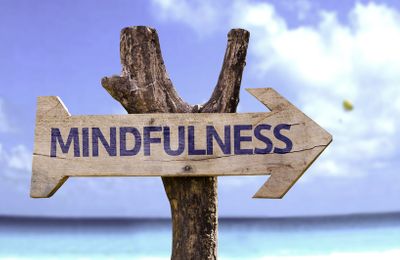When have we mindfully meditated enough? When will we find peace with what is on our minds? When have we observed what worries us long enough? After meditating and trying to be mindful of what I really feel, why do I still feel down?
These are questions that I frequently hear and have heard in this past week. The truth is that practicing mindfulness doesn't mean that we no longer will feel down, or feel "bad" feelings. Some life situations are just that big. So, in a way there's no real end point that we can know.
But, as we practice we become more aware of what we really do feel, and we stop spending energy to avoid those feelings and can begin to accept what we feel. In many cases, we will then feel much better.
I know that once I turn towards what I really feel, I find that I can accept what there is to accept and move forward in whatever way that is. There's a peace that comes from this.
Honestly, this has surprised me as some of what I've accepted in my life wasn't according to the "script" that I have in my mind, it wasn't something that I wanted. But by turning towards, I found I could accept and become free. Sometimes there was some sadness due to letting go, but that was so much better than trying to convince myself that I had control and could make things the way I wanted them to be. Again, by accepting I found peace and freed energy to connect to the present and to move forward.
One athlete recently told me that they're not the fastest at their sport. That this has been keeping them up at night as they worry about making it to the next level in their sport. I asked what would change if he merely accepted that he isn't the fastest. He paused and after a few moments said that he guessed that he could then focus on other areas of his game, especially ones that were strengths for him. He was also able to find examples of others who had success without being the fastest relying on other skills.
After mindfully turning towards his worries, I could see his body release the tension he had been holding. He said he felt less worried, like he had control for the first time in a long time because by turning towards the reality that scared him (that he isn't the fastest) he could accept it and not try to push it away, leaving him free to develop other skills.
One of the truths of life though is that our worries aren't always as straight forward as how fast a person is. Financial problems, marital strain and change, health, family...some of these life situations are going to weigh heavily on any of us. But our problems don't go away when we distract ourselves or bury them. The problem is there, only now we're burning our energy and time not dealing with the reality, no matter what that is.
So many times I've witnessed, and personally experienced, the power of turning towards what's really in our minds and hearts. As I've said before, we observe non-judgmentally, witnessing what's really there. If we find that we're frightened by what we see, we can let ourselves pull-back and come back to our breathing. Our breathing is always there for us, there to anchor us to the present. When we're ready, we can move towards again.
I began this series of writing with mindful breathing practice as the breathing acts as an anchor to the present for us. Anchoring to the present is important as our worries and ruminations are usually about a future situation, occasionally about a past one.
In any case, in the present moment, however small a point of time that may be, we are okay. If we are breathing, we are okay.
I know that may seem overly simple in our world, but take time to consider that idea: if we are breathing, we are okay. So by practicing the breathing, and being mindful in general, prepares and calibrates the platform that allows us to free our lives as we turn towards the more difficult parts.
To go back to one of the questions I posed at the start of today's writing, how long do we need to meditate or turn towards what's on our mind? Well, there's no clear answer. If you can meditate for 20 minutes on what's there, great. If 5 minutes, great. If 10 seconds, great. The real thing is to practice opening your mind, noticing what comes and if there are thoughts or feelings that are hard, to turn towards them and stay with them as you can. Just as a small trickle becomes a river, so too will our ability to mindfully witness. And I think that you'll find that you're able to pass through the hard parts to a more present, peaceful, mind.
Please feel free to send any comments or questions.
Dave Marks, LCPC 847-299-3400

